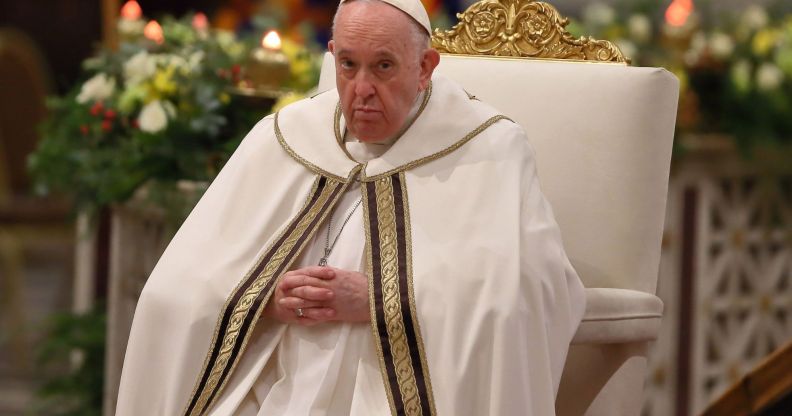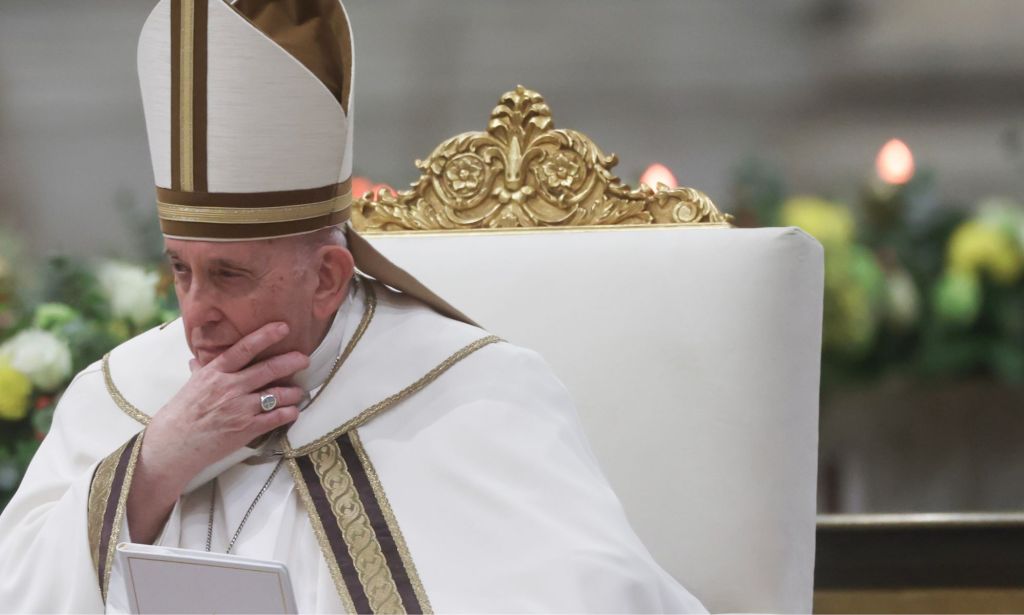Pope Francis clarifies views on homosexuality and sin

Pope Francis said homosexuality is “not a crime” and stressed that “criminalisation is neither good nor just”. (Getty)
Pope Francis clarified his recent comments on homosexuality and sin, saying his remarks referred to Catholic moral teaching.
The head of the Catholic church made headlines around the world after he blasted laws criminalising homosexuality. Francis said being gay is “not a crime” before saying that “it’s a sin”.
The pontiff further explained his position in a note to Jesuit priest James Martin, who runs the Outreach ministry for LGBTQ+ Catholics. Martin previously received praise for his inclusive work from the pope.
In his note, Pope Francis reaffirmed that homosexuality is “not a crime” and said he spoke out to “stress that criminalisation is neither good nor just”.
“When I said it is a sin, I was simply referring to Catholic moral teaching, which says that every sexual act outside of marriage is a sin,” he wrote.
“Of course, one must also consider the circumstances, which may decrease or eliminate fault. As you can see, I was repeating something in general.”
The pope acknowledged he could have been clearer in his previous comments. But he said he was speaking with “natural and conversational language” so it was “understandable that there would not be such precise definitions”.
“I should have said ‘It is a sin, as is any sexual act outside of marriage’,” Pope Francis said.
He added: “This is to speak of ‘the matter’ of sin, but we know well that Catholic morality not only takes into consideration the matter, but also evaluates freedom and intention; and this, for every kind of sin.
“And I would tell whoever wants to criminalise homosexuality that they are wrong.”

Some 67 countries or jurisdictions worldwide criminalise consensual same-sex sexual activity, according to The Human Dignity Trust. The majority explicitly criminalise sex between men via ‘sodomy’, ‘buggery’ and ‘unnatural offences’ laws.
There are 11 countries that have jurisdictions in which the death penalty is imposed or at least a possibility for private, consensual same-sex sexual activity.
The Catholic Church doesn’t recognise same-sex marriages, holding that the sacrament of marriage is a bond between a man and a woman. The church also condemns sex outside of marriage.
The pontiff has been surprisingly forthcoming about including LGBTQ+ members in Catholic proceedings despite continuing to uphold the church’s traditional teachings.
This is despite the Catechism of the Catholic Church, a text which contains dogmas and teachings of the church, describing “homosexual acts” as “intrinsically immoral and contrary to the natural law”. It also names “homosexual tendencies” as “objectively disordered”.
In 2013, Pope Francis famously said: “If a person is gay and seeks God and has good will, who am I to judge?”
He insisted that God “does not disown any of his children” in a letter to LGBTQ+ Catholics, and he urged parents to love their LGBTQ+ kids – not condemn them.
In 2021, he confirmed his stance on marriage equality, which remained a staunch ‘no’. Francis said marriage is a sacrament, and the “church doesn’t have the power to change sacraments” because it’s “as our Lord established”.
However, he said the laws that “try to help the situation” for LGBTQ+ people are crucial.
“Marriage is marriage,” he said. “This doesn’t mean condemning people who are like this. No, please! They are our brothers and sisters and we have to accompany them.”
During his recent interview, Pope Francis called laws criminalising LGBTQ+ people “unjust” and said the Catholic Church can and should work to put an end to them.
“We are all children of God, and God loves us as we are and for the strength that each of us fights for our dignity,” Francis added.
How did this story make you feel?

